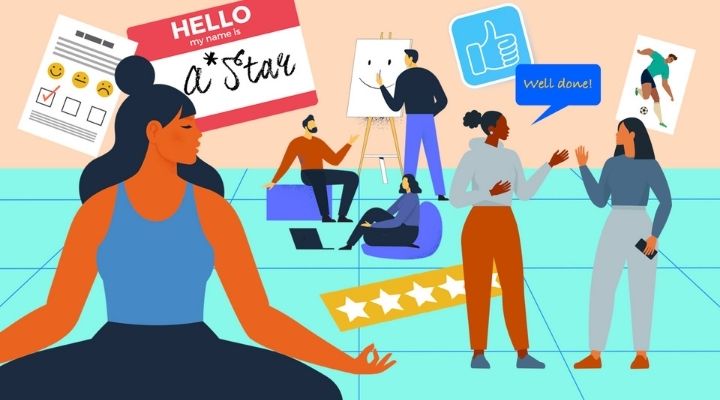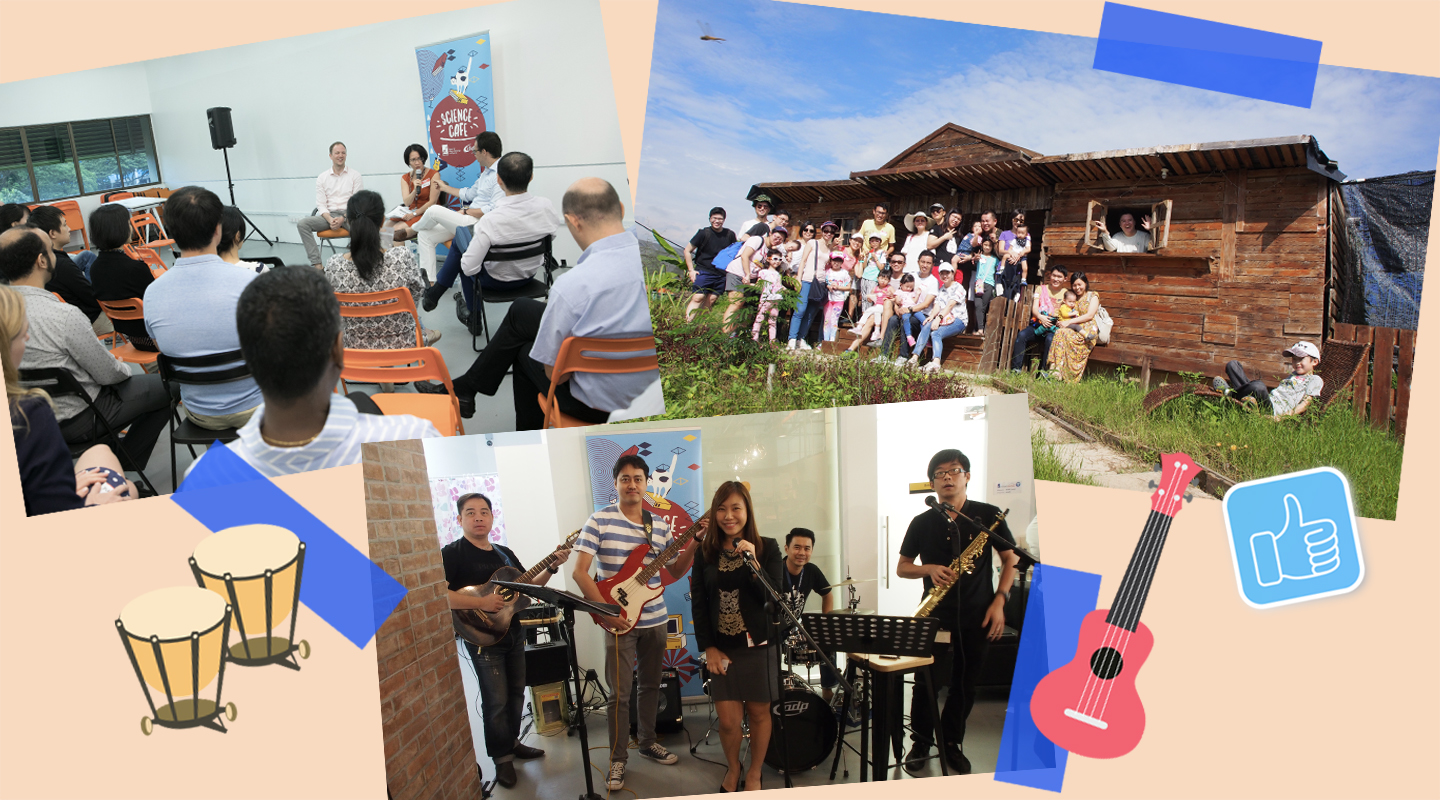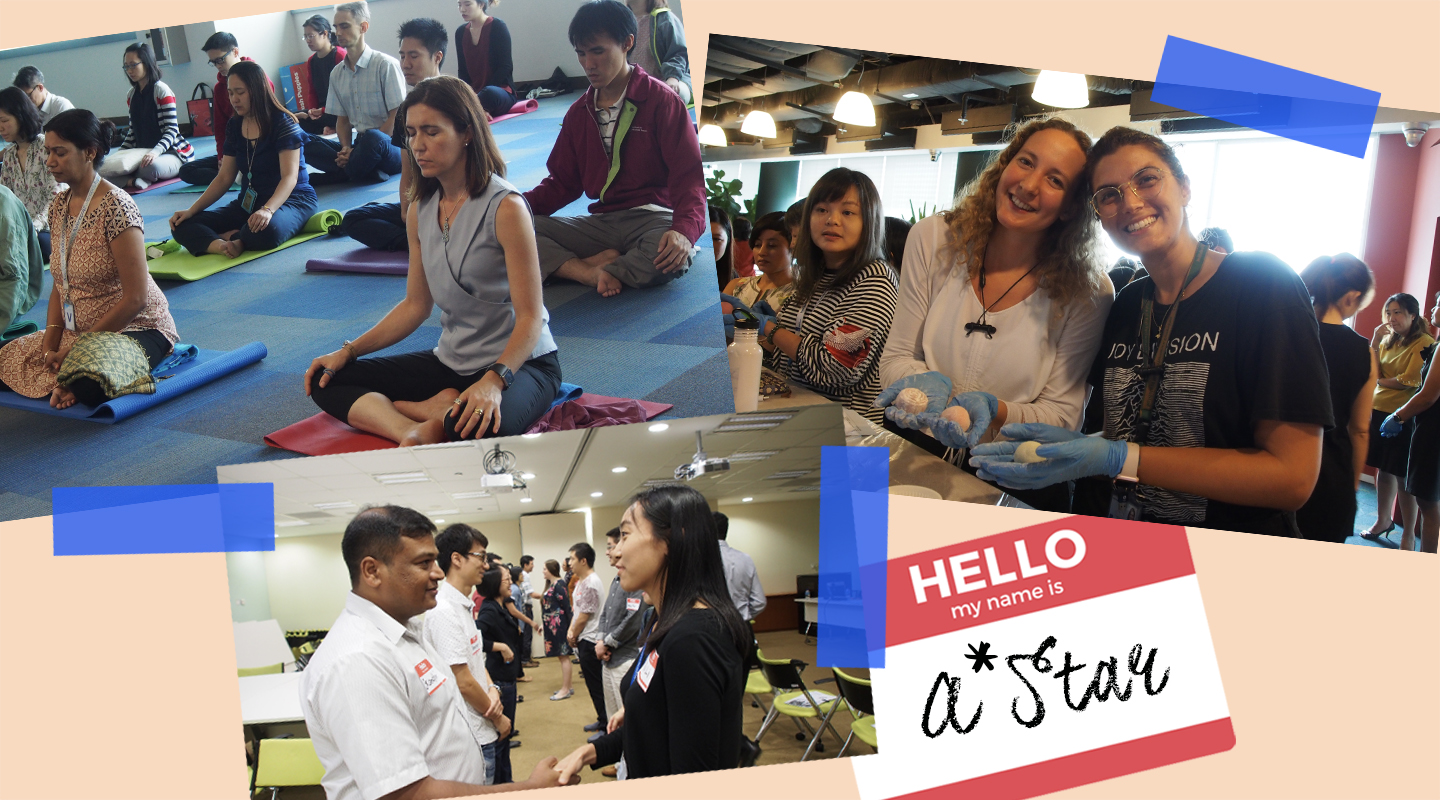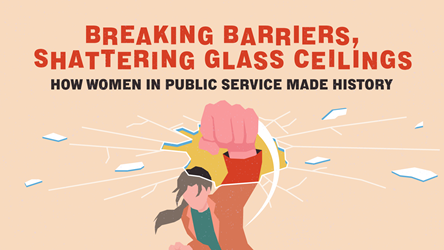A*Star For Employee Wellbeing At Work
At the Agency for Science, Technology and Research (A*STAR), employees support each other over informal social interactions to improve their overall wellbeing, perform better at work and deepen a sense of belonging.

By being open with her colleagues about her problems at home, Audrey (not her real name) saved her marriage – and career at A*STAR.
She had been having marital issues and parenting challenges. Frequent arguments at home led to marital woes and thoughts of quitting her job. But through A*STAR’s wellbeing programmes, which include parenting talks, she was able to receive support from other staff who are also parents – and know that she is not alone.
“At those talks, we create a safe space for staff to open up about issues they keep bottled up. We call these gatherings Communities of Practice, or the COP,” says Mr Hiroshi Limmell, Head of Infuse, an office that started in 2015 to champion employee wellbeing at A*STAR.
Starting on the Wellness Journey
Infuse began under the sponsorship of Mr Suresh Sachi, Deputy Chief Executive (DCE), Corporate. He says: “Way before COVID-19 hit, we sensed weak signals of stress in several parts of the organisation. We initiated the idea of building communities of interest and focus groups with the intent of supporting the health and wellbeing of our staff.
“From mindfulness sessions, we moved to training on mental wellness and the movement grew. We are therefore better prepared and able to scale our activities to help staff cope with the challenges brought about by COVID-19.”
Working alongside teams from various A*STAR units (Human Resource; Leadership & Organisation Development; the Office of Safety, Facilities & Administration; the Recreation Club; and the Corporate Social Responsibility committee), Infuse coordinates wellbeing-related initiatives to avoid unnecessary duplication of effort.
The small team comprises Hiroshi and Assistant Head Edmund Heng. Infuse is also the name for a physical space at A*STAR where staff can meet informally and share support.

Communities of Practice at A*STAR
Parenting: A partnership with a family counsellor to promote and support good parenting skills, and update on changes in the education system
Mindfulness: Training for staff volunteers to facilitate weekly mindfulness sessions to help staff ride the waves of uncertainty
Networking: To boost staff confidence and encourage a positive approach to collaboration and teamwork
Gender equality and diversity: To create a safe space and address the issue of unconscious bias.
Enabling Individual Wellness at A*Star
Since 2017, more than 3,000 employees have attended weekly COP workshops, forums and courses. In informal and social settings, “the usual hierarchy in public agencies became flat”, Hiroshi says.
“These casual events were hosted in the cosy spaces at Infuse. When COVID-19 hit, we moved the sessions online. Staff from all levels mingle and share each other’s personal tribulations at work and home. This humanises the workplace and adds authenticity to relations.”
With social distancing measures and work-from-home being the norm for the past year, A*STAR’s leadership has also found new ways to engage staff.
Since August 2020, Mr Sachi and Professor Andy Hor, DCE (Research), have been hosting weekly lunchtime Zoom chats with employees. The topics range from how the workplace can become more effective and innovative, to the dos and don’ts of scientific authorship. The two leaders also check in regularly with staff via Zoom to share their views and listen to feedback.
Prof Andy says: “Research is about being creative, resourceful, resilient and dedicated, none of which would be possible without taking good care of oneself – mind and body. It is critical that we look after ourselves and the people we work with.”
To promote mental wellbeing, A*STAR also has a free counselling service for staff to confidentially seek professional help when feeling emotionally down.
Spreading the Message of Wellbeing
Staff who attend these various wellbeing initiatives go on to seed the importance of emotional self-care when they return to their work spaces.
Hiroshi says: “Increasingly we see evidence-based research that individual wellbeing is significantly tied to workplace productivity. If one goes down, the other also takes a beating. They are not exclusive.”
While many religions and cultures have incorporated mindfulness into their practice for thousands of years, research from institutions such as the University of Massachusetts Medical Centre and the University of Oxford Mindfulness Centre now confirm “what monks have known for ages”, he adds.
Having a head start on employee wellbeing initiatives has served A*STAR staff well. “Since COVID-19 in 2020, when wellbeing became a national topic, we have been able to quickly level up wellbeing and do these sessions virtually,” says Hiroshi.
Tips for Starting Similar Wellbeing Initiatives
- Get a Management Sponsor
-
Find sponsors in senior management who believe in prioritising staff wellbeing. They can help open doors and provide guidance on how best to put ideas into action.
- Accept All That You Can Get
-
When others are open to trying out new ideas and practices, celebrate the progress even if they are seemingly small steps.
- Show the Impact
-
When new ideas and initiatives show positive results, support will stream in.
Debunking Myths
The concept of mindfulness first had to be demystified for those who were less familiar with it.
Infuse’s Edmund says: “Many thought mindfulness was tied to spiritual or religious practices, when in fact it is such an effective mental tool, like a pair of glasses that helps us see things more clearly.”
The team also looked to the private sector to observe what companies were doing for staff wellbeing. They picked out relevant best practices from enterprises including Google, Apple, Facebook, and Johnson & Johnson. Locally, the team studied community programmes in co-working spaces because of their innovative work culture.
These observations were then adapted to the COP events at A*STAR, such as breathwork, body scans, and mindful walking.

Senior Manager Stephanie Blanchard, who works at A*STAR’s Experimental Drug Development Centre, used to struggle with negative thoughts, her temper and a judgmental attitude towards others and herself. These affected her health and personal development.
Knowing she needed a change, she took up yoga and meditation, which helped her gain a more positive outlook on life. She says: “Thanks to the Mindfulness COP, I have been able to sustain and share my meditation practice.”
She began guiding weekly mindfulness sessions at A*STAR in 2018 expanding her meditation practice to help others. “Those who attended shared that they felt calmer and less stressed. This gives me a renewed sense of purpose.”
The Impact on One Staff and Beyond
Today, Audrey is thriving in her work at A*STAR, and enjoys a happy family and a more loving environment at home. She was so inspired by the sessions she attended at Infuse that she has since undergone parenting facilitator training, and is now able to offer a listening ear to colleagues facing issues in parenting or managing family dynamics.
Staff who are attracted to their first COP session based on a talk topic often become “regulars”, who then become active participants at the talks. “When we sense a critical mass of regular participants, we curate and hold facilitation training so that they can further support their community,” Hiroshi says.
These participants who become community leaders are also encouraged to provide input for new community programmes.
Dr Teoh Chai Lean, Head of Enterprise, is one example. She says: “I was self-conscious and lacked direction in my work. After joining the wellbeing and personal development programmes at Infuse, that soon became my happy place at work, where I learnt new skills and felt connected with others.”
She and several others then started a Project Management COP, which has grown into a community of more than 90 members within a year. “We use this platform to learn, discuss challenges and lend support to one another without judgment. This journey has taught me that one doesn’t need to be given a title to be a leader.”

It is doing the ordinary that is deadweight to any form of transformation.
As for starting up employee wellbeing initiatives, Hiroshi’s advice is to just do it.
“I know of many public officers who do not try out new ideas because they fear reprisals from their higher-ups for doing something that seems out of the ordinary, when it is doing the ordinary that is deadweight to any form of transformation,” Hiroshi says.

To get more stories like this, subscribe to the Challenge Telegram channel.
- POSTED ON
Sep 9, 2021
- TEXT BY
Siti Maziah Masramli
- PHOTOS BY
Courtesy of A*STAR









